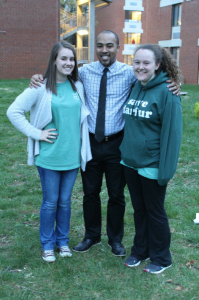The grassy field spread out in front of us, as we stood underneath a large tree to the side of the field. At the center of the field, a soccer game took place. There we were, existing in the margins, gathered for the Take Back the Night rally, organized against gender-based violence. bell hooks, an author and human rights activist, argues “[marginality] is…the site of radical possibility, a space of resistance” in her book Out There: Marginalization and Contemporary Cultures (341). And that’s what we were and are, that small group of people underneath the tree, taking up a space of resistance, the site of radical possibility.
Within that space under the tree, we learned about local community organizations working against gender-based violence. Some individuals chose to recount their experience as a survivor of sexual violence, and others performed songs or skits as a way to relay their stance on the issue. Morgan Harrington’s mother Gill Harrington, founder of Help Save the Next Girl, spoke about her dedication to raise awareness of gender-based violence through prevention education. Missing teen Alexis Murphy’s aunt Trina Murphy also shared the same sentiments as Gill Harrington in providing information to combat gender-based violence and abductions. The Keynote Speaker at the rally was Gordon Braxton, a 2002 U.Va. alum who is the founder of the blog Allied Thought: A Blog on Manhood and Gendered Violence Prevention. Braxton stated that the focus of his speech was to get more individuals, especially those standing on the “fence” about sexual assault prevention advocacy, involved in advocating for the end of gender-based violence. While trying to get allies to participate in advocacy work, he observed, “If you listen to what is being said, what’s being asked of you aren’t necessarily big things to do.” And isn’t that true? As advocates and activists, we are asking for people to stand on the margins with us, whether it be for a night at the Take Back the Night vigil or belonging to a group on Grounds that promotes sexual assault prevention or telling someone why the rape joke they just made isn’t funny. Braxton’s view of advocacy resembles a quote I learned while participating in Green Dot, a national bystander intervention program related to power-based violence prevention, “No one has to do everything, but everyone has to do something.” The smallest action paired with all of the actions taken in an activist movement propels the initiative forward.

Here is one of my friends, Gordon Braxton, and me posing for a picture after the Take Back the Night rally.
Recently, I’ve spent a lot of time thinking about what sustains me as an advocate. My answer isn’t an easy one nor am I fully sure of it, but I do know that the work I participate in is work I believe in. The work is emotionally draining. It is tough, not being able to ignore the systems of power in place, not being able to be ignorant. At times, this space of resistance can feel lonely, but then, I remember all of those individuals participating in advocacy work and realize the site of radical possibility in which I stand. Advocacy work is transformational.
After this academic year at U.Va., I wanted to leave Charlottesville for the summer, I wanted to not focus so much on sexual assault prevention. I wanted space to breathe, time to take a step back. However, I received an opportunity to stay in Charlottesville and work on a project that will digitally archive the history of sexual assault at U.Va. I wanted this opportunity so badly, yet I hesitated when I received the e-mail from the internship director about her interest in hiring me. I thought about the offer I was given to return to Montreat for a third summer, to work with preschool-aged children. With the internship, I knew I would have to stay in Charlottesville, to focus on the history of sexual assault at the University. And, ultimately, I declined Montreat because I know that the internship opportunity is working toward changing the culture of U.Va., toward setting a precedent for other colleges and universities to own their history and to make sure history does not repeat itself. After spending my past two summers in Montreat, where I met great friends and incredible families, my decision to decline my contract was difficult, but I know that my choice to stay in Charlottesville is one based on what I want to see happen in the future at the University, on what I see myself working on in the future: gender-based issues. So, thank you to everyone who has supported me along the way.